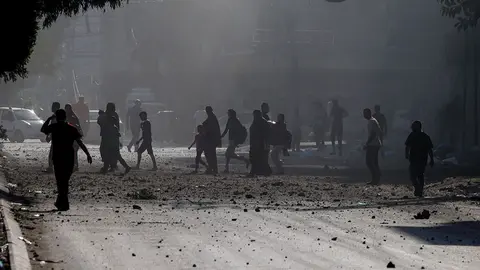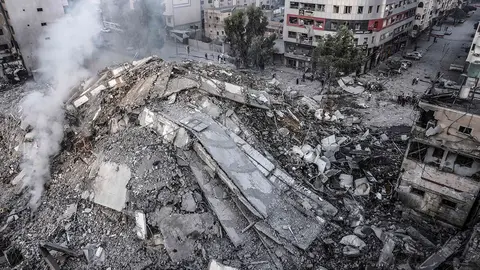We are in the hands of Saudi Arabia

According to the World Bank's Commodity Markets Outlook report, while conditions in the Middle East are not what they were in 1970, the current turmoil could push global commodity markets "into uncharted waters".
In the worst case scenario, if the Israel versus Hamas conflict ends up involving other regional players such as Iran, there would be the possibility of "choking" oil supplies by as much as 8 million barrels per day.
"This would drive benchmark Brent crude oil prices from around $95 to escalate to between $140 and $157 per barrel, more than double current prices," the World Bank warned.
The invasion of Ukraine triggered a series of sanctions against Russia that, among other things, led to a boycott of Russian oil and gas by the European Union (EU) and led Europeans to shoot themselves in the foot with the sanctions as they paid almost three times the price of gas last winter and petrol was up to 30 cents more expensive per litre.
The current big question mark in the face of Israel's aggressive military response to Palestinian civilians in the Gaza Strip has to do with the position that Saudi Arabia, the world's leading oil producer and whose diplomacy has been in talks for more than two years with its Israeli counterparts, mediated by the White House, to get the Saudi monarchy to recognise the existence of the State of Israel and establish diplomatic, economic and trade relations, will finally adopt.
As recently as 21 September, Prime Minister Benjamin Netanyahu announced publicly that Israel was weeks away from signing a landmark diplomatic agreement with the Riyadh government.
A deal that drew open criticism from Iran's President Ebrahim Raisi, who condemned the normalisation of diplomatic relations between Saudi Arabia and Israel as a 'stab in the back to the Palestinians' and their resistance, after 75 years of Jewish occupation, of Palestinian territory.
In March this year, another historic rapprochement took place with the restoration of diplomatic relations between Iran and Saudi Arabia. In fact, Raisi phoned Saudi Crown Prince Mohammed bin Salman over Israel's bombardment of Palestinian civilians, which has already killed more than 10,000 people in Gaza in preliminary figures.
On the subject
According to reports in the Middle East press, both men condemned Israel for what they agreed to call war crimes against the Palestinians.
However, it is not known whether Saudi Arabia will eventually suspend its rapprochement with Israel and take a more active role in the cause of the Palestinians.
Over the past three years, Saudi foreign policy has maintained some puzzling decisions, especially for the White House, which considers Saudi Arabia one of its allies in the region.
Contrary to expectations in the wake of Russia's invasion of Ukraine and the Western boycott of Russian oil and gas, US President Joe Biden asked Bin Salman to ask Saudi Arabia to increase its oil production in order to contain a rise in oil prices on the international market. However, Saudi Arabia did just the opposite.
In fact, this year Saudi Arabia joined Russia in extending its oil production cuts: until next December, one million barrels per day of Saudi Arabian oil and 300,000 barrels per day of Russian exports have been cut.
Before the Israeli war on 7 October, Brent crude futures rose above $90 per barrel for the first time this year. U.S. benchmark West Texas Intermediate crude oil rose to $87.75 a barrel. These cuts impact 1% of world supplies and there are now two wars with geostrategic scope.
And let us remember that crude oil prices have risen by more than 20% since mid-June. This increase has come in the face of continued economic weakness in China, the most important customer for oil exporters such as the Saudis. This fact should not be lost sight of...



